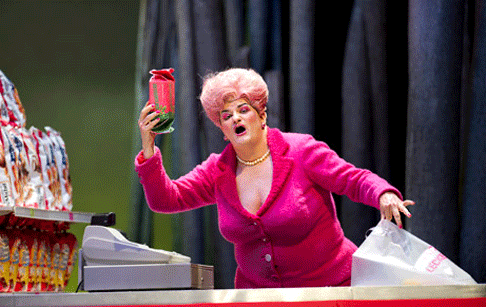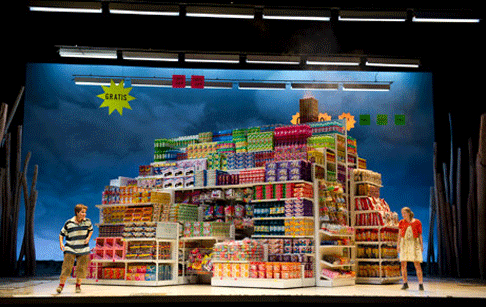01 Sep 2010
Englebert Humperdinck: Hansel und Gretel — BBC Prom 61
The annual visit of Glyndebourne Opera to the BBC Proms has become an eagerly awaited event.

The annual visit of Glyndebourne Opera to the BBC Proms has become an eagerly awaited event.
This year, Laurent Pelly’s 2008 staging of Humperdinck’s fairy-tale favourite, Hansel and Gretel, with its economical, ‘recession-savvy’ sets — brown cardboard boxes à la homeless-city, floor-mop trees, litter-strewn landscape and flimsy paper ovens — proved a timely and fitting choice for the restricted stage space and theatrical basics available at the Royal Albert Hall. The absence of luxurious stage designs and copious props was certainly not a hindrance to Stéphane Marlot’s clever adaptation for the Royal Albert Hall, which hinted at fantasy and enchantment but left it to the audience’s imagination to fill in the ambiguous gaps — which is just as it should be in fairyland.
After a long Glyndebourne run, which began in July, the cast were confident and at ease; interestingly, performances that might have lacked freshness were given a boost of spontaneity by the unfamiliar locale, none more so that the arrival William Dazely’s Father, surreptitiously signalled by a speculative glance to the back of the Arena by conductor, Robin Ticciati. A boisterous Dazely, clutching two bursting supermarket-bags, raucously negotiated his way through a crowded, surprised Proms Arena, lurching and launching himself over successive barriers to climb up to the stage — the cymbal player serving as a useful bag carrier as the final hoist was accomplished.
As his wife, Imgard Vilsmaier was rather less rough and ready. Vilsmaier has a big Wagnerian voice — booming the Mother’s frustration and despair to the rafters of the Gallery — but it is a pleasant-toned instrument, one which she modulated skilfully in her Act 1 aria to convey her maternal distress and despair.
But it is eponymous siblings who dominate the opera, and this production presented a superlative pairing. Alice Coote, enacted an astonishing metamorphosis to petulant, prepubescent mischief-maker — a touch of attention deficit disorder, perhaps? Coote was exhaustingly hyperactive, even managing to make disappearing into a cardboard box appear interesting and amusing. Her glorious tone was consistently projected with clarity and warmth - one cannot imagine a better Hansel, or a mezzo-soprano who enjoys the role more. Lydia Teuscher, as Gretel, held her own admirably with such a seasoned partner. Possessing a crisp, clear soprano, she twisted and twirled engagingly with her impish brother, their voices entwining with breathtaking beauty in the Evening Prayer.
Attired in a fluorescent pink two-piece suit and bouffant wig, Wolfgang Ablinger-Sperrhacke was an eye-watering picture of consumerist and gastronomic greed as the Witch. His ‘Shirley-Bassey’ strutting, brazenly clutching an upturned mop — microphone or broomstick? — raised uncomfortable hackles, and anticipated the exposure of his chilling intent when he whipped off the wig and revealed the sinisterly bare-headed, pot-bellied, knife-wielding monster beneath the deceptively frivolous drag-queen apparel.
 Wolfgang Ablinger-Sperrhacke as the Witch
Wolfgang Ablinger-Sperrhacke as the Witch
In the absence of the full trappings of the opera house, it was essentially left to the lighting scheme to successfully evoke location and ambience. The panels encircling the raised platform variously shone ice-blue, for the loveless, foodless family home; blared gothic red for the slaughter-house kitchen; twinkled luminous silver for the moonlit forest; and gleamed verdant green for the final familial reunion. Despite these resourceful effects, it remained somewhat difficult for the minor roles to establish their character effectively, in such a large arena, although the performances of both Tara Erraught, as the Sandman, and Ida Falk Winland’s Dew-Fairy captured the ambiguous bitter-sweet mood of this production.
The children’s chorus, no doubt well-drilled for Glyndebourne, sang sweetly but looked a little unsure and slightly stilted as they moved around the confines of the stage platform. The Dream Pantomime is a clever concept though: Pelly presents a pristine parade of white-frocked, well-fed children, gorging on Big Macs while a hungry Hansel and Gretel can only dream of gluttonous gastronomy — an ‘angelic host’ which leaves the children nothing but discarded wrappers and empty bellies. As one critic has put it, this is a sharp metaphor for the ‘haves and have-nots’, a pertinent message which Pelly presumably hoped would not be lost on the affluent Glyndebourne clientele.
 Lydia Teuscher as Gretel and Alice Coote as Hänsel
Lydia Teuscher as Gretel and Alice Coote as Hänsel
Conductor Robin Ticciati, danced light-footedly on the podium before an engaging and committed London Philharmonic Orchestra. Ticciati proved himself a master of rhythmic flexibility, skilfully controlling pace to expose the juxtapositions of sweet joy and melancholy deprivation, energetic optimism and despondent resignation, which characterise the score. The orchestra provided the tints and shades of the rich colour palette which was missing visually; their energetic playing never tipped into Wagnerian weightiness, as Ticciati conjured both the effervescence of the children’s escapade and the satisfyingly soporific moments of rest.
There were no sub- or sur-titles for this performance; thus the audience were prompted out of an habitual ‘laziness’, forced to listen closely to the sung text, or attentively follow the libretto provided in the programme, or to rely on their familiarity with this well-known tale. There were no complaints, and no difficulties, as far as I could tell; we simply rediscovered our ability to be responsive to what was presented to our eyes and ears, an effort which audiences should be pushed to make more frequently perhaps?
As the fairy-story reached its equivocal ‘happy ever after’, Ticciati’s baton drew ravishing warmth from his players. Pelly’s reading of this Grimm tale may be ironic and more than a little shadowy, but the darkness on this occasion was buried beneath the orchestral light and hope.
Claire Seymour